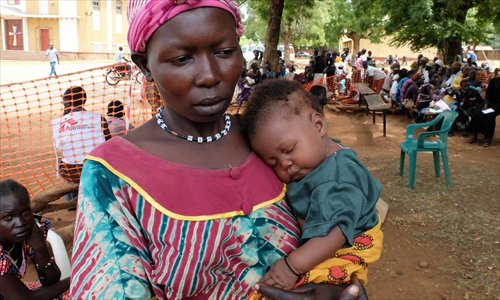South Sudan violence threatens doctors, peacekeepers

A MSF vehicle helps people to flee from a provisional camp on February 18 in Malakal, South Sudan.

Cicilia takes her toddler Hasamia to a MSF mobile clinic for a malaria test on July 18. Photos: Courtesy of MSF
Humanitarian aid, an oasis among the desert of war, is facing a crisis in South Sudan, as a recent violence erupted on July 8 in the capital of Juba, tangling different humanitarian groups such as Doctors Without Borders (known by its French acronym MSF) and the UN's World Food Program (WFP), injuring and killing several Chinese UN peacekeepers, and at least 42,000 fled their homes.
Wei Baozhu, a media manager of MSF, told the Global Times that no group should target humanitarian workers, as the violent situation worsens in the country.
The intense 4-day battle in Juba has wrecked the peace deal reached in 2015 to end the civil war that began in December 2013 when President Salva Kiir accused Riek Machar of plotting a coup. The new battle threatened to drive South Sudan, the world's newest country, back into civil war, despite a fragile cease-fire.
Emergent medical rescue
The UN has warned that the possibility of a humanitarian crisis is growing, saying there were shortages of food and water, as the WFP's main logistics hub was picked clean.
WFP said it was "outraged" by the theft of more than 4,500 tons of food "intended for the poorest and most vulnerable people" in a country trying to stave off famine.
According to AFP's report on July 16, much of the stolen food was trucked away from the sprawling base on the outskirts of Juba: A large-scale, well organized operation that would have required hundreds of trips. Other goods were carted away in cars, motorbikes, wheelbarrows and on people's heads.
More than a third of South Sudan's population is expected to face severe food shortages over the coming months and the war-torn nation runs the risk of a "hunger catastrophe," according to the UN.
Beside food and water, medical aid is also threatened by the unrest. South Sudan is one of the biggest projects for MSF, with a staff of more than 3,300 including international members and locals working in local MSF hospitals.
After the violence first erupted on July 12, MSF started running mobile clinics, which have now provided care to more than 6,000 people, according to MSF's statistics.
The cease-fire has been respected in the sense that militarized groups are not fighting each other now, but there is still a lot of shooting and looting going on, according to recent reports.
"According to many of the patients we saw, as well as our South Sudanese staff, one particular area of the city is still very insecure," Ruben Pottier, MSF field coordinator, was quoted as saying in a statement.
Escaping from the violence, many people lost family.
"Today I met an 8-year-old boy whose mother and father were both shot and who now has no one to take care of him," Pottier noted in his report.
MSF, which has been working in this area for 35 years, offers emergency medical rescue to those in need no matter their nationality, race or political stance. But it has often been attacked by local armed forces.
On February 17, an appalling attack on a camp established to aid civilians shocked the northern city Malakal, where a doctor from MSF was killed while rescuing a wounded local, according to a MSF report.
Raquel Ayora, the general project manager of MSF, slammed this kind of unscrupulously violent actions against humanity, saying that, "We are heartbroken and shocked by the death of our innocent coworker."
The violence in the Malakal camp clearly showed that the protection and humanitarian aid could be implemented only if the conflicting parties normalize their hostile actions.
Pursuing peace process
China has always participated in and pushed forward the peace process in South Sudan.
During the violence, two Chinese UN peacekeepers, who were lightly armed as required for peacekeeping, were killed on duty.
The soldiers were on patrol in an armored vehicle near a refugee camp in Juba on July 10, when shelling killed them and injured six others.
After the sudden outbreak of violence, China sent a special representative to Africa to communicate and coordinate with other mediating parties to actively promote peace talks and move conflicting parties in South Sudan toward implementing cease-fire, halting violence and resuming talks at an early date.
Zhong Jianhua, a special representative of the Chinese Government on African Affairs, started his trip to Africa on July 20 and had an in-depth exchanges of views with the Kenyan foreign minister, permanent secretary of the Ministry of Foreign Affairs of Uganda, and the African Union Commissioner for Peace and Security.
Zhong also talked with African leaders and other parties involved about adjusting the authorization of the UN Mission in South Sudan, sending additional armed forces from regional countries to South Sudan.
Zhong said that China supports African countries resolving African issues in an African way and regional countries in maintaining communication and coordination with relevant parties involved in the South Sudan issue.
He added that China is willing to maintain close contact with relevant parties and continues to push forward the peace process in South Sudan.
Newspaper headline: Aid at risk